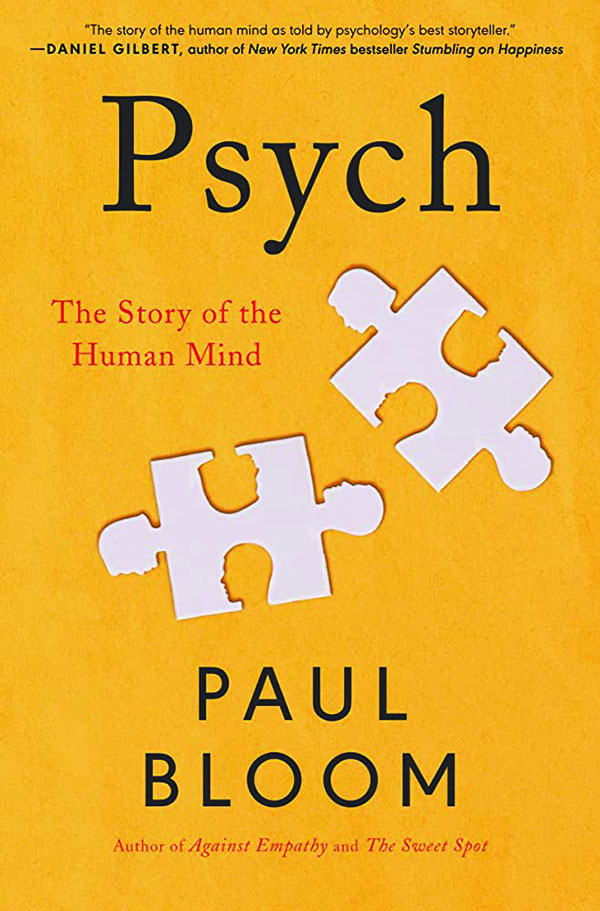
Paul Bloom’s journey through the mind
Erin Montgomery
Professor Paul Bloom’s Introduction to Psychology is one of Yale’s most popular courses of all time. In his new book, Psych: The Story of the Human Mind, his eighth, he provides readers a tour of that course and of many of the ideas he’s developed over his career as a research psychologist, with plenty of well-placed anecdotes and quotations from great thinkers and philosophers throughout history to reinforce his teaching points.

The book gets off to a scientific start as he explores the more complicated neurological processes involved in human thought (the role of neurons and neurotransmitters, for example). From there, it’s on to a brief look at the human brain and the “science of consciousness” and the unconscious.
Next, he introduces us to notable early theorists, behavioral and developmental psychologists, and the more pivotal experiments of their time — for example, Pavlov’s dogs, Skinner’s “superstitious” pigeons, and Piaget’s studies of babies and the four stages of cognitive development. Some of this content will be familiar to anyone who has taken an introductory course in psychology. But Bloom asks the big, thought-provoking questions, and his passion and enthusiasm for his line of work are evident on every page. For example, he bemoans how the area of developmental psychology doesn’t get the same respect as other areas of psychology. This is too bad, he says, because “the study of children carries a special wonder” and has the “potential [to answer] broader questions that people have wondered about for a very long time. Just as one example, take the question of destiny. How much of our fate is sealed early in life, set in stone by our genes and our early experience?”
Bloom goes on to provide an overview of the power and universality of language, the inner workings of sensation and perception, the “fuzziness and malleability” of memory, and the gamut of human emotions and the role they play in adaptation and evolution, with a special focus on the author’s favorite one: disgust. Bloom’s fascination with emotions doesn’t stop with Psych. His 2016 book, Against Empathy: The Case for Rational Compassion, makes the intriguing argument that empathy is an often-misplaced emotion that can, believe it or not, lead us to make poor moral decisions.
In the last third of Psych, his discussion moves to the most relatable topic of all: “ourselves, our special, special selves.” Why do we think what we think and do what we do? What contributes more to our individual personalities — genes or the environment? Why do we form social biases? What factors cause us to conform, even at the expense of another’s well-being? What is the relationship between our IQ and the likelihood that we will live a happy, fulfilling life? As Bloom explains, “it’s hard to find anything valuable that doesn’t correlate with IQ. Higher-IQ people tend to have more satisfying relationships and better mental health. … They tend to be healthier and live longer.” He adds, “As best anyone knows, there is only one bad trait associated with high IQ — bad eyesight.”
But what exactly defines a happy, fulfilling life? My answer could be different from yours or Bloom’s. And during those times when our lives don’t feel so happy and fulfilling, will therapy make a difference? As for Bloom, he recommends therapy because “the evidence suggests that it is, on average, better than no therapy.” The treatment of mental illness (including therapy) is “at a primitive stage” as a science, though.
In any event, Bloom is quick to remind readers that he is not a therapist. At the beginning of the chapter on mental illness, he writes, “When asked what I do for a living, I used to answer, ‘I’m a psychologist.’ But this gave the wrong impression; people thought that I was a therapist. So now I add: ‘…the kind that does research.’ One friend has a better answer: ‘I’m a psychologist but not the sort that helps people.’”
I’m sure Bloom’s friend was just trying to poke fun at him, but I’d argue that he or she doesn’t give our affable professor enough credit. Bloom’s latest book is a success at giving readers a taste of their own minds and leaving us wanting more. Reading Psych is helpful, perhaps even therapeutic, in that it reminds us that “no matter how wise we are, so much of life is simply out of our hands.” Readers will learn a lot about themselves and perhaps, as a result, be more aware of how both their personal biases and external forces, like the politicization of certain events (by both sides of the aisle), can cloud their better judgment.
Erin Montgomery is a writer and nurse living in Florida.
